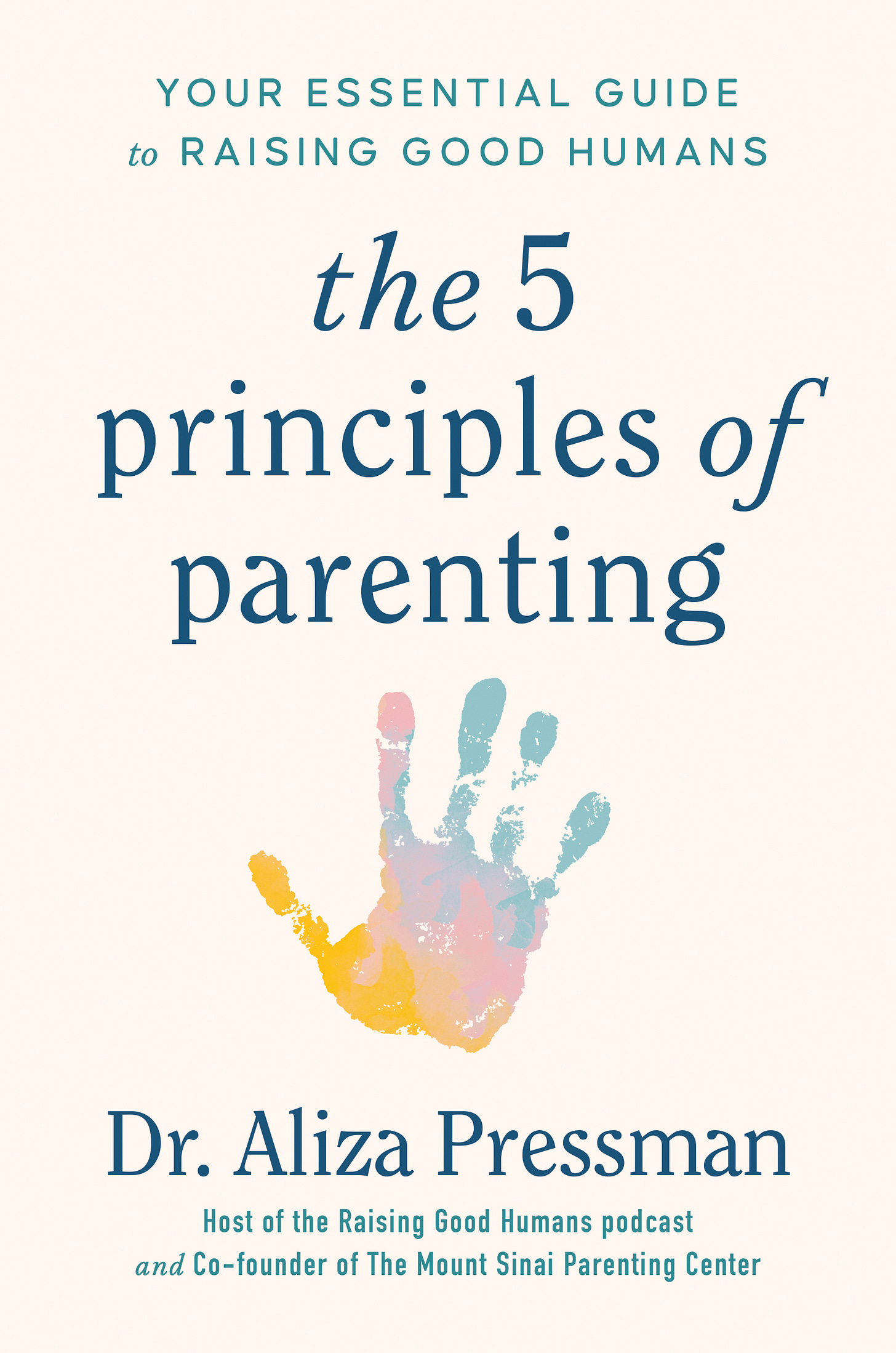Thanks for reading Raising Good Humans on Substack! My first book, The Five Principles of Parenting: Your Essential Guide to Raising Good Humans is now available for preorder here. All pre-orders will allow for access to exclusive LIVE events and will be eligible for exclusive bonus content this Fall. I am SO GRATEFUL for you and SO excited to get this book out into the world!

It’s that time of year again! From painful wake-ups to frequent meltdowns, being resistant to going to school (particularly after a long summer) is not as uncommon as you might think.
Dear Dr. Aliza, my 8 year-old, tells me everyday that he absolutely hates school. He cries that he doesn’t want to go, is a terror to get out of bed in the morning, and fights every step of the school routine (homework, too). When he gets there, I hear from the teacher that he is fine, is making friends, looks engaged, etc. Why does he save all his resistance for me, and why is he pretending to hate something that I think he may enjoy?? HELP!
Why do our kids so often fight things that they enjoy, or things that they haven’t even tried? Well…it’s complicated.
One aspect is good old-fashioned anxiety. Sometimes our children struggle with the anticipation of something, rather than the task itself. Their anxiety lies in the imagining of the day, in the potential for things to go wrong, or the dread of a hard moment. But remember, anxiety isn’t all bad, and there are many examples of when anxiety can actually be helpful.
Instead of trying to have your child fight the feeling of dread, help them to name it and go easy on themselves for having that feeling. Remind them that their body is trying to tell them to pay attention in a new way, and that those feelings are helping focus their attention throughout the day. Without making it about removing the anxiety, talk to your children about welcoming it as a familiar, albeit complicated, friend, accepting it as a valid response, and working to not be scared or startled by it. Maybe that sounds something like, “I know it feels hard to go to school today. It feels that way this morning at this moment, and that is OK. You are still able to make it through the day, even if it is uncomfortable. I know you can do it.”
Another aspect to consider is motivation. As we’ve talked about before, our children are not always motivated to do the things they have to do…even if they enjoy them. We can’t enjoy something everyday, and even many highly productive and healthy striving kids (and adults) still work hard to push themselves through their day.
When your son is melting down at home, you are seeing the work he is doing to push himself. Ultimately though, you get the chance to see him succeed when you hear reports from the teachers that all is OK. Try helping him find motivation that works for him - like being woken by the dog (it’s hard to yell at a happy dog) in order to get out of bed, or have him take a break in the morning to do something he enjoys. Be creative and involve him in figuring out what gets him going and keeps him focused.
Don’t forget about venting. We are often so ready to fix the hard feelings that we forget to listen. Listening is HARD work, and a hugely important part of the parent-child relationship…especially as kids grow. Being a good listener will help your child know that when it comes to you, expressing ALL of their emotions (even the hard ones) is safe.
Right now, it sounds like your son needs to vent his frustrations and as a result sounds super negative to you. Though this isn’t fun for you (being a receptacle for this stuff isn’t easy), it may be the very thing that allows your son to be carefree and happy during the day. After quite literally dumping on you, he feels better. We have the opportunity to be the one who can hold these feelings and sit on our hands.
Lean into routines where, and when, you can. The more you can help make the school day predictable, the less your child may feel like they need to rebel against it. Remember that these routines are new to our families again, after a summer without them. It takes time to fall back into the program.
If you haven’t already, make sure the school day is fairly standard during the week - with regular bedtimes, wake times, homework windows, screen time limits, and meals. When your child can predict what comes next, he will be less likely to fight each day as if there is a possibility to change it. Try making this routine something your child can begin to manage independently, either with a checklist or schedule, and let them set some of the routines when they can.
Take a breath and balance your own feelings. I know, I know, it’s easier said than done. Resistance from our children can make us see red. We can’t underestimate the response we elicit in our children when we allow ourselves to become dysregulated, too.
Instead of resorting to yelling, threats, or panic, try calming your own nervous system and focusing on your own response. We cannot control our children, but we are capable of controlling our response to it. Find what works for you - whether a breath, a cup of coffee, walking away, splashing some cold water on your face, or repeating a mantra in your head.
Keep the questions coming :)
A quick reminder to pre-order my first book, The Five Principles of Parenting! In it, I’m helping you to translate science into everyday challenges, and when you pre-order you get special benefits - including a virtual seminar, and custom content specifically made for you. AND when you pre-order, you are helping me SO MUCH. Every single person who pre-orders the book, helps book sellers and shops to see that demand is high and convince them to stock The Five Principles of Parenting on their shelves. I need your help to make sure that happens, and so I promise special benefits to make it worth taking the lap to pre-order today.





